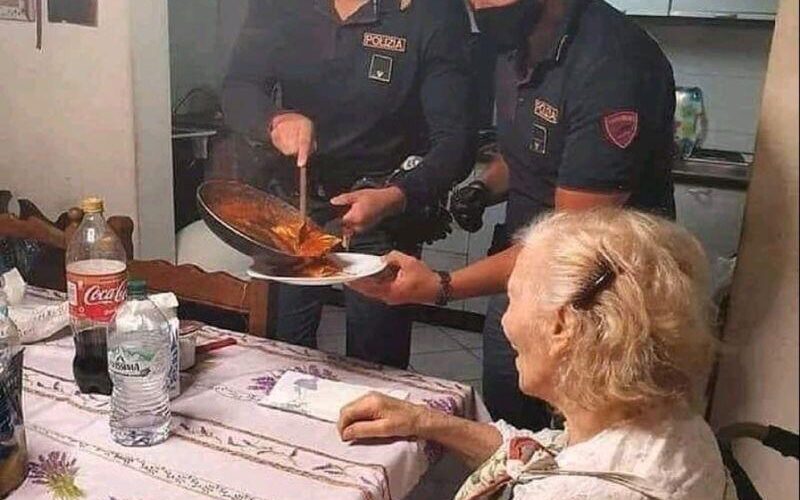She Was 87, Hungry, and Alone—So the Police Made Her Dinner
In a small apartment tucked away in Florence, Italy, an 87-year-old woman sat quietly by herself, the weight of solitude pressing heavier than the years on her bones. It was a night like so many before—silent, empty, and cold.
But this time, she picked up the phone.
Not to report a crime. Not for fire or theft. She dialed emergency services because she simply couldn’t take it anymore. She was tired. She was hungry. And above all… she was lonely.
And someone—someone—had to know.
When officers Antonio and Giuseppe received the call, it was marked as “non-critical.” Just a wellness check. But what they walked into wasn’t a crime scene—it was something far more human.
There were no signs of violence, no accidents, no fire.
Just one elderly woman, eyes heavy with sadness and a kind of fatigue that sleep can’t fix. Her home was quiet, clean, but barren of life. No family photos. No fresh food. No warmth. Just a kettle that hadn’t been used in days… and a refrigerator with little more than a half-empty jar of sauce.
The officers didn’t ask many questions. They didn’t need to.
They just looked at her.
She didn’t cry. Not then. She just said softly, “I’m hungry.”
What Happened Next Wasn’t in the Manual
They could have left. They could have called social services and logged it as “case closed.”
But Antonio and Giuseppe stayed.
They stepped into her modest kitchen, rolled up their sleeves, and opened the cabinets. What they found wasn’t much—some canned tomatoes, a box of pasta, garlic, and a bit of dried basil.
But that was enough.
They cooked. They stirred. They heated a small pot of tomato ravioli—nothing fancy, but warm and made with care. They set the table with a cloth. They poured her a glass of water. They sat with her while she ate, not checking their watches, not worrying about their next call.
She took a bite, looked at them… and then she smiled.
And for the first time that day, she didn’t feel invisible.
They didn’t just give her food. They gave her something much rarer:
Presence.
No Headlines. No Protocol. Just Humanity.
This wasn’t a PR stunt. There were no cameras. No social media posts. In fact, no one outside that kitchen would have ever known—until someone quietly shared it with a local paper, and from there, the story rippled across the world.
Why? Because it hit us where we’re most vulnerable.
We all fear loneliness.
We all dread being forgotten.
And in an age of hyperconnectivity, feeling truly alone is the cruelest irony of all.
The story of these two officers didn’t go viral because they broke the rules—it went viral because they rewrote them.
Loneliness: The Silent Emergency
Experts now warn that chronic loneliness is as dangerous to health as smoking 15 cigarettes a day. It increases the risk of heart disease, stroke, cognitive decline, and early death.
But loneliness isn’t always obvious. It doesn’t show up on CT scans. It doesn’t set off alarms.
It shows up in the voice of an 87-year-old woman calling emergency services, not because her house is on fire—but because her spirit is burning out.
A Meal Becomes a Message
What Antonio and Giuseppe served that evening wasn’t just a bowl of ravioli.
They served:
-
Dignity to someone who felt invisible.
-
Warmth to someone trapped in emotional winter.
-
Connection in a world that often walks right past the elderly.
They reminded us that being “of service” doesn’t always mean chasing sirens or criminals.
Sometimes it means boiling water.
Sometimes it means staying when it would be easier to leave.
Sometimes it means being human first, officer second.
And What About the Woman?
She didn’t ask for much.
She didn’t want money. Or gifts. Or even attention.
She just wanted to not be alone.
And for one night, two strangers made sure she wasn’t.
We may never know her name. But in her story, we recognize ourselves, our parents, our grandparents… and the future we all hope we never face.
In the quiet kitchen of a forgotten apartment, something sacred happened.
Not an emergency. A moment.
And maybe that’s the kind of emergency we should all start responding to.
